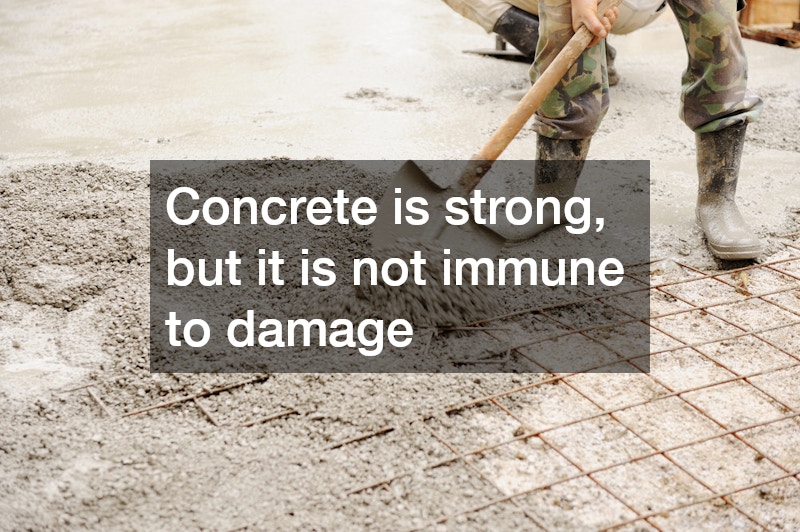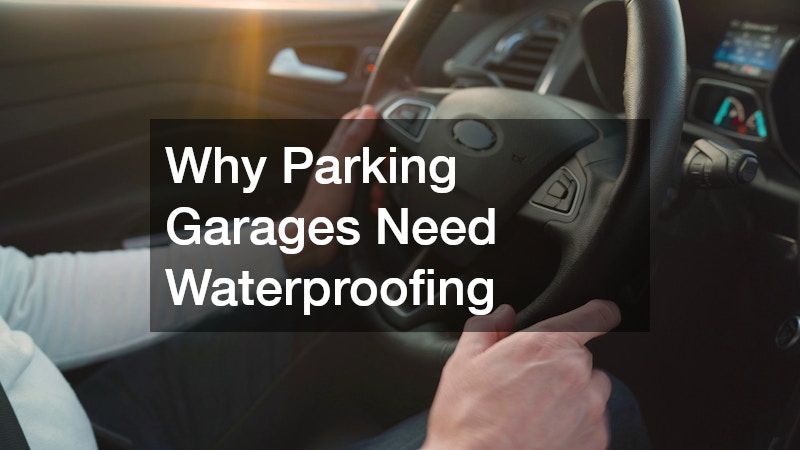
Parking garages are built to withstand constant vehicle traffic, exposure to the elements, and heavy use year-round. However, without proper protection, these structures can suffer from serious damage over time—damage that is costly to repair and can even pose safety risks. One of the most effective ways to protect these structures is through parking garage waterproofing. By preventing water intrusion, waterproofing extends the lifespan of the structure, preserves its appearance, and reduces long-term maintenance costs.
The Impact of Water on Parking Structures
Concrete is strong, but it is not immune to damage. Over time, water can seep into the porous surface of concrete, carrying salts, chemicals, and other contaminants.
This is particularly true in colder climates where snow and ice bring de-icing salts into garages. Without parking garage waterproofing, that moisture can penetrate deep into the structure, causing steel reinforcements to rust and expand, leading to cracks and spalling.
Even in warmer climates, water exposure can create problems. Rainwater can collect on surfaces, seep into joints, and cause deterioration in both concrete and steel. Over time, these issues compromise structural integrity, making waterproofing an essential preventative measure.
Protecting Structural Integrity
The primary goal of parking garage waterproofing is to protect the building’s structure. When water reaches the reinforcing steel within concrete, it causes corrosion. As the steel rusts, it expands, creating internal pressure that leads to cracking, flaking, and eventual weakening of the structure. This damage can spread quickly, leading to extensive and expensive repairs.
By applying a high-quality waterproofing system, such as sealants, membranes, or coatings, you create a protective barrier that keeps water, salts, and chemicals out. This helps maintain the garage’s strength and stability for decades.
Extending the Lifespan of the Garage
Parking garages are a significant investment, and owners expect them to last for many years. Without parking garage waterproofing, the lifespan of the structure can be drastically shortened. Constant exposure to moisture accelerates wear and tear, which means repairs will be needed more frequently.
Waterproofing not only prevents premature deterioration but also reduces the frequency of maintenance. This means fewer disruptions for tenants or customers and lower operating costs in the long run.
Improving Safety for Users
A damaged parking garage isn’t just an expensive problem—it’s a safety hazard. Water infiltration can create slippery surfaces, especially when combined with oil or debris from vehicles. Freeze-thaw cycles in colder regions can also cause cracks to widen and surfaces to become uneven, increasing the risk of accidents.
Parking garage waterproofing improves safety by keeping surfaces dry, minimizing the risk of slips, trips, and falls. It also prevents damage that could lead to structural instability, ensuring the garage remains safe for vehicles and pedestrians.
Preserving Aesthetics and Property Value
A well-maintained parking garage makes a strong impression on tenants, customers, and visitors. Stains, cracks, and spalling not only look unappealing but also signal neglect. For commercial properties, a deteriorating garage can hurt the overall image of the business and reduce property value.
Waterproofing helps maintain the appearance of concrete surfaces by preventing discoloration, rust stains, and visible deterioration. This not only enhances curb appeal but also shows that the property is well cared for, which can be an important factor for potential buyers or tenants.
Cost Savings Over Time
While parking garage waterproofing requires an upfront investment, it pays off significantly over time. Repairs to concrete and steel reinforcements can be costly and disruptive, especially if sections of the garage must be closed during construction. Waterproofing helps prevent these issues, saving money on major repairs and avoiding lost revenue from reduced parking capacity.
Regular inspections and timely waterproofing maintenance can further reduce costs by addressing small issues before they become large problems. In many cases, the cost of preventive waterproofing is a fraction of what you would spend on extensive structural repairs.
Choosing the Right Waterproofing Method
Not all parking garages are the same, so waterproofing solutions should be tailored to the specific needs of the structure. Common options include:
-
Sealants and Coatings – Applied to the surface to create a water-resistant barrier.
-
Membrane Systems – Provide a durable, flexible layer that prevents water penetration.
-
Joint Sealants – Protect expansion joints from water infiltration.
A professional parking garage waterproofing contractor can assess the structure and recommend the best approach based on climate, usage, and existing conditions.
Parking garages face constant exposure to moisture, chemicals, and heavy traffic—all of which can take a serious toll on their structure and safety. Investing in parking garage waterproofing is one of the most effective ways to protect that investment, extend the life of the structure, and maintain both safety and appearance. From preventing costly structural damage to preserving property value, waterproofing is a smart, proactive step that benefits owners, tenants, and visitors alike.



